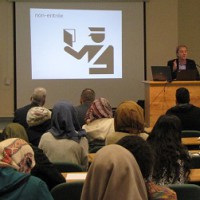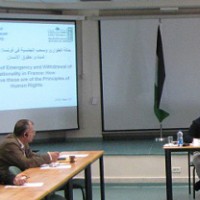
- 22 December 2020
The Annexation Projects: the Political and Legal Implications
The Institute of Law on Wednesday, 10 June 2020, with support from Konrad-Adenauer-Stifitung, has organized a legal encounter entitled “The Annexation Projects: the political and legal implications”. The encounter took place through Zoom. The speakers were: Ms. Suhad Bishara, a lawyer and the head of the Land and planning department in Adalah – The Legal Center for Arab Minority Rights in Israel, Mr. Jamal Jum’a the coordinator of Palestinian Grassroots Anti-apartheid Wall Campaign, and Dr. Hasan Jabarin, a lawyer and the director of Adalah, as part of Birzeit Legal Encounters program, that the institute organizes in the West Bank and the Gaza Strip.
Jamil Salem welcomed the participants. Ms. Suhad Bishara was the first speaker; she gave an analysis of the legal aspects of the expected annexation operation. She emphasized on a very particular point; while the common discourse circulating, that the annexation project doesn’t change the situation on the ground, as annexation is considered to be the core of the Zionist project, and has always existed, therefore there is nothing new in that project, is true, nevertheless it is not very accurate. If annexation takes place, no matter how big or small the annexed parts of the land are, it will bring with it a large number of discriminatory laws – such as those promulgated in the 1950s – and extend its application to the annexed parts. Palestinians can easily imagine all the devastating consequences such laws can have, laws that implicitly aims to force the local population to evacuate the land.
On the International law level, the annexation discourse represents new challenges for the Palestinian researchers, academics, and jurists. Israel has always violated international law norms in the OPT, however until now those violations have been dealt with singly and separately, the Israeli overt decision of annexing parts of the West Bank, even if it is not executed anytime soon, renders the colonization a systematic and an ongoing act, therefore posing serious questions on how to deal with the Israeli system, how to define that system as a whole, and how to frame, analyze and expose the Israeli practices.
The second speaker was Mr. Jamal Jum’a, it was a very practical intervention, where Mr. Jum’a displayed a map made by the well-known Dutch cartographer Jan de Jong. He gave a complete and detailed explanation of the geographical aspects of the Israeli colonial project in the West Bank, which started in 1967.
Mr. Jum’a showed, on the displayed map, the areas targeted by the annexation, which includes mainly the east of the West Bank (the Jordan Valley) but also its west. One could be surprised when realizing that the western villages of Ramallah, Selfit, and the villages situated to the north west of Jerusalem. Mr. Jum’a went on explaining the great economic damages that would follow from the annexation of these areas. The Jordan Valley is the most important source of livestock in the West Bank, an important percentage of the agricultural wealth will be also lost, but most importantly is water resources, in fact, water resources in the West Bank are concentrated in the areas that will be annexed in the eastern and western parts of the West Bank. Mr. Jum’a finished his intervention by exposing the numerous difficulties that Palestinians will face in their daily life if the annexation takes place, most importantly the additional obstacles added to the freedom of movement.
The third and last intervention was that of Dr. Hasan Jabarin. He started his intervention from the point Ms. Bishara has emphasized; the annexation is de acto taking place, and this has been the case since 1967, and the very particular status of Jerusalem is by far the clearest example. The question therefore is “what is new?” “What has changed?” “why evoking the matter of annexation now?” The difference now is that the annexation we’re talking about is an annexation according to the Israeli law, the whole current discussion turns around one essential point; will Israel promulgate a clear and overt law through which it explicitly declares that parts of the West Bank are now subject to its sovereignty and accordingly constitutes a part of the Israeli State? It is this particular point that causes all this controversy.
The step of promulgating a law that will legalize the annexation raises a heated debate inside Israel too. Up until now, Israel has been very reluctant when it comes to promulgating overtly racist laws; they would rather impose the facts on the ground than legalizing such practices. It is what differentiate it from the Apartheid system in South Africa; the Israeli legal culture does not legalize racism. So the main question is therefore will the annexation be applied according to a law? Or without it? And if the law is promulgated will that mean that the Israeli legal culture has changed towards one that is much more similar to that of the Apartheid regime in South Africa? Or will it continue with its traditional culture of practicing racism on the ground without the interference of law? This is not a simple matter and it is a very controversial issue inside the Israeli society.
Dr. Hasan expected a sever opposition inside the Israeli community to the annexation project. The international community, on the other hand – if we excluded the U.S. which supports the annexation – sees in in this project an end to the European project; the European project is based on one principle “two states for two people”, therefore we are waiting to see the position of the international community. As for the Palestinian position, Dr. Hasan expects that annexation will change the Palestinian discourse back to the discourse of “the right to self-determination”. In his opinion if annexation takes place – and the new de facto situation extends in time – along with an American support, a European and International silence, and an Arabic and Palestinian weakness, this will make the situation – with time – go back to what it was in the 1950s and 60s – No Palestinian State. This strike for the Palestinian State project, will force Palestinians to change their right discourse and adopt again “the right to self-determination” discourse, that discourse which provoked an enormous worldwide echo in the 1970s and 80s, but has dimmed during the past two decades.
Around 100 participants attended the legal encounter. The participants were then given the opportunity to comment and ask questions.

- 20 December 2016
The Legal Framework of Cybercrime in Palestine
On Tuesday, 20 December 2016, the Institute of Law (IoL) and Faculty of Law and Public Administration at Birzeit University organised a legal encounter on The Legal Framework of Cybercrime in Palestine.

- 12 May 2016
The Palestinian Road Accident Casualties Compensation Fund: Legal Framework and Social Role
In the context of the Birzeit Legal Encounters, the Institute of Law (IoL) of Birzeit University organised on Thursday, 12 May 2016,

- 06 November 2018
The Institute of Law (IoL) at Birzeit University, in partnership with Konrad Konrad Adenauer Stiftung (KAS), organized a legal encounter in Gaza regarding "Housing rights in light of mass displacement during the 2014 war on Gaza"
The Institute of Law, Birzeit University, in partnership with Konrad Adenauer Stiftung (KAS), organized a legal encounter in Gaza, regarding "Housing rights in light of mass displacement during the 2014 war on Gaza". The meeting was held on Thursday, 1 November 2018.

- 22 November 2016
The role of the Group 77 in promoting the development of Foreign International Cooperation
On November 22, the Konrad-Adenauer-Stiftung Palestinian Territories and the Institute of Law held a legal encounter at Birzeit University on the topic of “The role of the Group 77 in promoting the development of Foreign International Cooperation”

- 11 May 2016
An Overview of the Law by Decree on Social Security
Gaza - Wednesday, 11 May 2016: In partnership with the Konrad Adenauer Stiftung - Palestinian Territories, the Institute of Law (IoL) of Birzeit University organised a legal encounter,

- 18 September 2017
Palestinian Prisoners and Released Prisoners’ Salaries and Benefits from a Legal and Human Rights Perspective
Gaza - On Tuesday, 11 July 2017, the Institute of Law (IoL) of Birzeit University organised a legal encounter on Palestinian Prisoners and Released Prisoners’ Salaries and Benefits from a Legal and Human Rights Perspective.

- 03 November 2016
International Law and the Refugee Crisis
On Thursday, 3 November 2016, the Institute of Law and the Faculty of Law and Public Administration at Birzeit University, with support from the Konrad Adenauer Stiftung, held a legal encounter entitled “International Law and the Refugee ‘Crisis’”

- 15 February 2016
The State of Emergency and Withdrawal of Nationality in France: How Disruptive these are of the Principles of Human Rights
Birzeit ‒ 15 February 2016: In the context of activities sponsored by the French Universities Consortium in support of the Faculty of Law and Public Administration at Birzeit University,
 Legal Encounters
Legal Encounters








